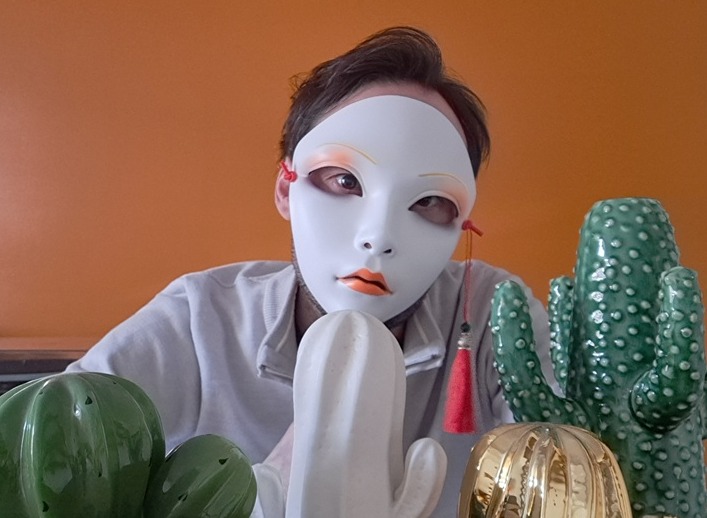Diet and Irrritable Bowel Syndrome
Published 19 May 2017 • Updated 20 Oct 2020 • By Léa Blaszczynski
Avril tells us her story about more than 30 years of fighting against IBS and now being almost free of it. Not always medicines are going to help us get better, sometimes a simple change of lifestyle is what we need.

Hello Avril, could you please introduce yourself in a few words?
I'm a retired teacher with two adult children and four grand-children. I live with my husband in a small village in the heart of the English countryside, where I enjoy walking, bird-watching, gardening and creative arts (such as photography).
When were you diagnosed with Irritable Bowel Syndrome and how did you get the diagnosis?
I was diagnosed with the diarrhoea-dominant form of IBS when I was in my early thirties after routine blood tests and X-rays revealed no signs of other, more serious conditions, such as Crohn's or Coeliac Disease.
Was it hard to cope with the condition? Did it change something in your everyday life?
It was extremely hard to cope with. Being driven out of bed every morning and spending most mornings frequently and urgently visiting the bathroom was very disruptive to my routine. It changed my life completely. From being an active, out-going person who loved travelling, I became virtually housebound and fearful of going anywhere. I could no longer go out to work full-time (teaching was out of the question), which affected my finances, I couldn't travel far, and it was difficult to mix socially. After some bad experiences in supermarkets, after a while I stopped doing the family food shopping. (Fortunately, my husband was able and willing to do the shopping and the morning school run.) Eventually, because of so many restrictions on what I could do, eventually it also affected me emotionally, and I became depressed.
What medications and remedies did you try before feeling much better?
To begin with I was given various medications to help relieve the symptoms. These didn't help at all, and some even made my symptoms worse. (One medication gave me blood poisoning.) When I refused further medications, I was put on an exclusion diet, but, although this did help to reduce the symptoms to a degree, at the same time it made it even more difficult for me to mix socially because I couldn't eat a lot of the food offered at events.
You have been suffering with IBS for thirty-five years and now you are much better. What has been the secret of this recovery?
Probiotics and another change in diet! After so long without any real reduction in my symptoms, I decided one day to do my own research to try and figure out what was wrong with me. I discovered that I actually had two problems.
One was an inability to properly digest cow's milk (which had given me obnoxious wind and abdominal bloating since birth). The other was the diarrhoea which had started after a bout of gastro-enteritis at the age of 32.
What led me to discovering the allergy to cow's milk was my reading a really useful book entitled 'Eat Right for your Type'. In it, the author (Dr. Peter J. D'Adamo) states that 'most dairy products are not suitable for people with blood type A - for the simple reason that Type A blood creates anti-bodies to the primary sugar in whole milk...' Not everyone in the medical profession agrees with the general hypothesis in Dr. D'Adamo's book, but I can report that when I eliminated all dairy products from my diet, my wind and bloating disappeared within days.
My allergic reaction to dairy products showed me that my immune system had played a part, and that it had also been under continual stress. Stopping that stress was my first step in recovery. However, I still had the diarrhoea, though not as badly as before. Though the original bad bug had been eliminated, something had changed to cause continuous symptoms. I believe this change was a change in the microbiome of my digestive system.
When I had a stool analysis at one point in time, it was found that I had very few of the good bugs in my bowel. So, although I didn't have the bad bugs, I didn't have enough of the good bugs either. These bugs help to protect the bowel wall. So these needed replenishing. My gastro-enterologist suggested a probiotic called VSL#3 which I was able to get from Boots the chemist. (It's expensive and unfortunately not always available on prescription via our GP, which I think it should be.) Those we can buy in the supermarket in the form of yoghurt-like drinks do not work, because the good bugs get destroyed by our stomach acid, and we need to get them further down the digestive system to the bowel.
When I discovered the lack of good bugs, I asked myself why these were not re-generating themselves, and after much research, I concluded that it was because they could not adhere to the cell walls of the bowel. The reason for this was I believe due to something called lectins. That is toxic food lectins. These do not normally cause problems in people, but may do so when the bowel wall is compromised in some way, as in the case of an infection, or in the absence of protective good bugs. These lectins are natural proteins found in many foods, especially in cereals. I figured that if I cut out as many of the lectin-rich foods from my diet as possible, it would give the bowel wall a chance to repair itself and for the good bugs to then re-generate.
So my next step then was to cut out the lectin-rich foods from my diet. This was difficult because it left very little that I felt able to eat, and it was necessary to cut them out for up to a year. The medical profession does not seem to have taken this lectin thing on board, but there is information about toxic food lectins on the Internet. Lectins are a natural protein in plants that protect the plants from attack by insects. So they are natural insecticides. When I cut out these foods from my diet, my symptoms slowly but surely improved. Now I eat goats' products instead of cow's. For cereal I eat mainly rice, maize/corn, and millet. And I'm re-introducing a lot of foods I once thought I couldn't tolerate, such as fruits, including raspberries and grapes. And I eat organically-produced food as much as possible, to avoid foods that may have residues of chemical sprays, such as insecticides and herbicides. And I only take medications when absolutely necessary. This is to avoid putting the immune system under stress, for these things can be toxic.
What positive message would you like to share with our readers?
Never give up hope. When you're having a bad day remember that it may not always be so bad.
If possible, eat fresh, organically-produced food, and supplement your diet with probiotics that are known to work.
12 comments





 Facebook
Facebook Twitter
Twitter



